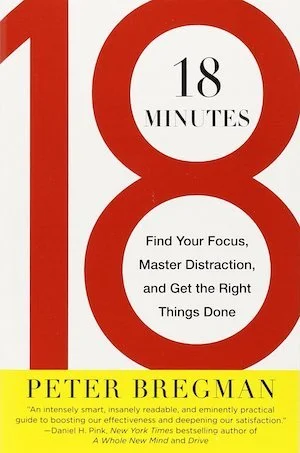18 Minutes
Peter Bregman’s 18 Minutes is a good read on time management that will give you practical tips on how to set and maintain your focus on the tasks you want to get done, rather than the tasks that crop up with the most urgency.
288 pages • published 2012
When I was a manager, I always found myself with more tasks than the time to do them. Most days, I’d get home and wonder what I’d done all day, since I’d been so incredibly busy, yet hadn’t made progress on the big goals I needed to work on. If this sounds familiar to you, Peter Bregman’s 18 Minutes will be a useful guide to time management.
Bregman’s strategy is to be very clear about which work you really need to be doing and be rigorous in maintaining focus on only those things. He gives clear examples from his extensive experience as a consultant, and writes in a brief, page-turning style that is easy to digest.
Split into four sections, I found the most value in the middle two. Part One: Hover Above Your World covers material about building self-awareness. It’s a great introduction to concepts like confirmation bias, how our assumptions shape the version of the world that we see, and simple tools to help you notice when you’re letting events drive your behavior in negative ways.
“So often we scramble to get a lot accomplished in a day and succeed - only to realize, in retrospect, that those things we accomplished won’t get us where we want to go. It’s not lack of effort. It’s a lack of focus and direction.”
Part Two: Find Your Focus asks you to choose a focus for your year, choosing to highlight what makes you unique, your strengths, your passions, and forward progress. Here, he shows why setting limits on how many things you are trying to accomplish helps you work more efficiently, and how it helps reduce stress and feelings of overwhelm.
The tactical portion of the instructions can be found in Part Three: Get The Right Things Done. He has a specific system which takes 18 minutes a day, hence the book title. The key is creating an annual task list and refining carefully what is and is not included on that list. Then, every day, spend five minutes in the morning selecting and scheduling items from your to-do list into you day. During the day, every hour, spend one minute refocusing yourself to ensure you’re not veering off into distraction. Every evening, close the day with five minutes to reflect and review how the day went.
Bregman shares useful strategies for how to curate and cultivate your task list, as well as more detail on the three phases mentioned above. My main takeaway is the morning minutes - spending time everyday deciding what you will work on today and not letting things that pop up distract you and pull you away from your intended goals.
Part Four: Mastering Distraction covers a lot of anecdotes on distraction that didn’t stick with me. The main learning point was that multitasking is bad for productivity.
“Doing several things at once is a trick we play on ourselves, thinking we’re getting more done. In reality, our productivity goes down by as much as 40 percent, because we don’t - and can’t - multitask. We switch-task… The research shows that heavy multitaskers are less competent at it than light multitaskers.”
The majority of Part 4 felt specific and not directly applicable to my circumstances. As you read this - or any book on productivity - you will find that some things land and some things miss. The key is to take away the pieces that work for you to build your unique system. What works for me may not work for you, and the parts of this book that I liked the most might be the least helpful for you. However, even when reading material that felt familiar, I still saw it from a new perspective and found value.
There is a good amount to learn from this short book. It’s easy to read, it is packed with personal anecdotes and business examples, and it made me feel like the author understood the realities of the fever pitched pace of the business world. Even when the author was discussing concepts I was already familiar with, it felt like a review of key material and a reminder, as opposed to a retread. I recommend 18 Minutes to anyone who wants to get a better grasp on doing the right tasks instead of the loudest ones.
